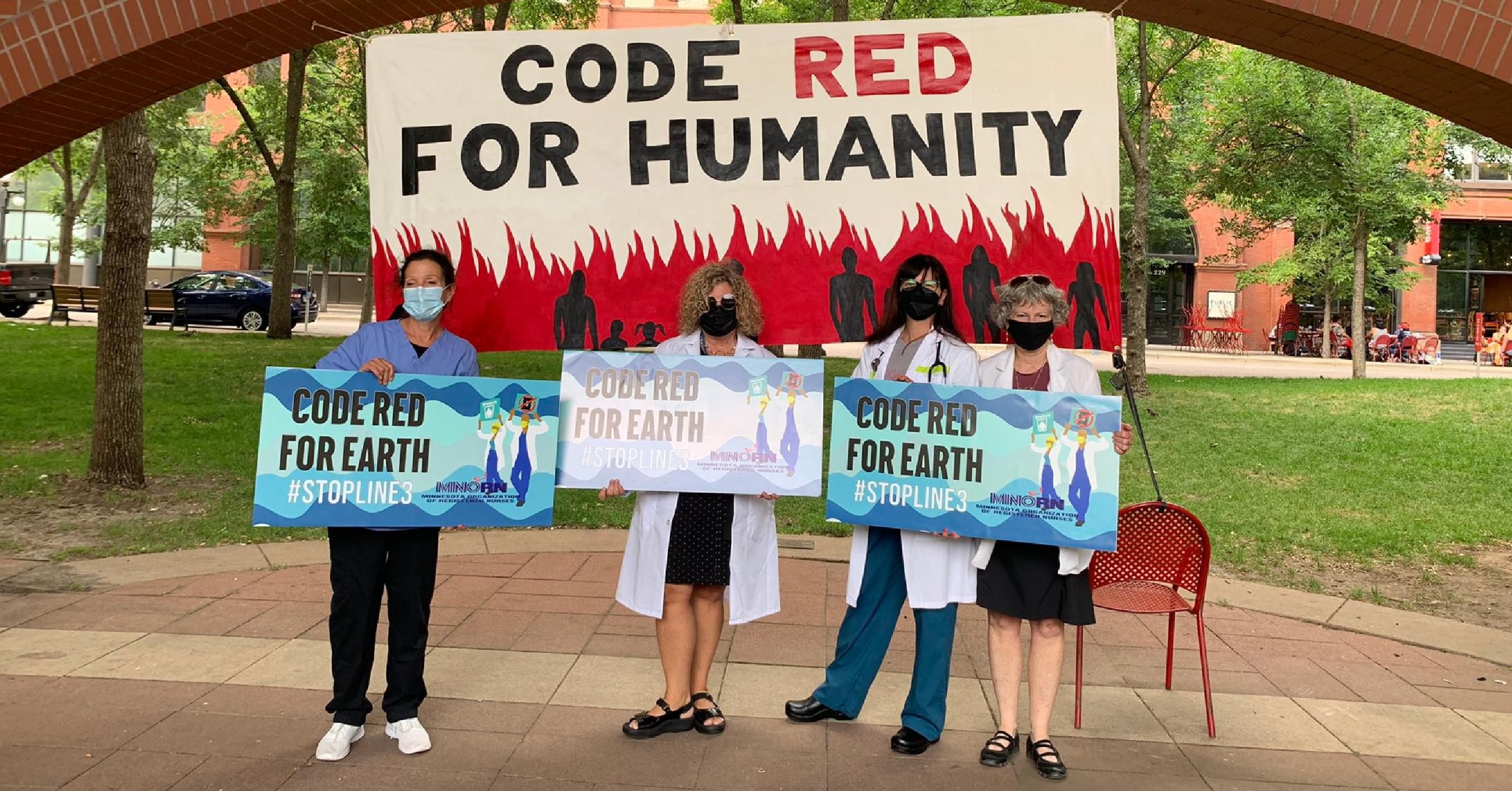
U.S. doctors, nurses, and other health professionals came together Tuesday for a national day of solidarity against Line 3 that included various events and a letter calling on President Joe Biden to block Enbridge’s tar sands project.
The health professionals are pressuring Biden to “take action that climate science demands, listen to the voices of Indigenous frontline leaders,” and reverse the federal government’s permitting of Line 3 under former President Donald Trump.
Their call echoes demands of Indigenous and climate activists who have long fought against the Canadian company’s effort to replace an aging pipeline with one that would have the capacity to transport 760,000 barrels daily.
Noting the United Nations Intergovernmental Panel on Climate Change (IPCC) report on the latest climate science that was released last week, the health professionals write to Biden:
We applaud you for rejoining the Paris climate agreement and canceling the Keystone XL Pipeline. We now call on you to revoke the permits for the Enbridge Line 3 pipeline expansion in Minnesota. Line 3 will carry the same product as the Keystone XL Pipeline, dirty tar sands oil. If it is put into operation, Line 3 will accelerate the damage to our climate, releasing carbon emissions equivalent to that of 50 coal plants, every year. This is in stark contrast to your stated goal to reach a net-zero emissions economy by 2050. We have neither the carbon budget nor financial budget to continue investing in fossil fuel infrastructure if we want to meet that ambitious but necessary goal. We also don’t have the time—as U.N. Secretary General António Guterres stated, the IPCC report “…must sound a death knell for coal and fossil fuels, before they destroy our planet.”
The health professionals highlight that Line 3 is a problem for not only the climate but also environmental justice, warning that letting the project proceed conflicts with Biden’s “stated goal to stand up against fossil fuel companies and other polluters who put their own profits over people and disproportionately harm communities of color and low income communities.”
“Line 3 cuts through the heart of the Anishinaabe territory in Minnesota, violating treaty rights, damaging sacred wild rice beds, and threatening the health of our Indigenous communities, who have already experienced generations of oppression and trauma due to exploitation of their land and their people,” the letter says. “Health professionals across the country stand in solidarity with our Indigenous leaders who are putting their bodies on the line to defend sacred water, land, and climate.”
Pointing out that “Line 3 negatively impacts manoomin, a sacred food central to the Anishinaabe way of life,” Thaius Boyd, an Ohkay Owingeh tribal member who is also a part of Health Students for a Healthy Climate, said in a statement that preventing the project “safeguards Indigenous health, environment, and future generations.”
The letter was spearheaded by Health Professionals for a Healthy Climate and signed by Physicians for Social Responsibility (PSR), Medical Society Consortium on Climate Change and Health, Academy of Integrative Health & Medicine, Alliance of Nurses for Healthy Environments, Medical Students for a Sustainable Future, and multiple state groups.
Individual health professionals also spoke out against Line 3 on Tuesday.
“Americans need to—and want to—end our addiction to oil, because it’s exacting a terrible toll on our health and destabilizing our climate,” said Dr. Jonathan Patz, director of the Global Health Institute at the University of Wisconsin-Madison, in a statement.
Patz—who, for 15 years, served as a lead author for the IPCC, which was awarded the Nobel Peace Prize in 2007—also spoke at a Tuesday afternoon event in St. Paul, Minnesota, one of at least a dozen actions nationwide.
“The carbon-intensive extraction from open-pit mining makes tar sands the world’s most destructive oil operation threatening our health and the environment,” Patz said. “And like tar in cigarettes, the bitumen in tar sands oil, which is released when pipes inevitably burst, is carcinogenic. Use of this hazardous substance must end here and now.”
“Americans across the country are experiencing health impacts of climate change this summer—extreme heat, drought, and poor air quality from wildfire smoke,” noted Dr. Laalitha Surapaneni, an assistant professor at the University of Minnesota Medical School.
Surapaneni, who is on the PSR board of directors and a member of Health Professionals for a Healthy Climate, asserted that “it is essentially science denial to permit a pipeline of this magnitude during a climate crisis.”
Minnesota Rep. Dr. Kelly Morrison (D-33B), a practicing OB-GYN, explained that “as a physician and a state legislator, I believe it is my obligation to advocate for public health.”
“The recently released U.N.’s IPCC report has been described as a ‘code red for humanity,'” she said. “Climate change has rapidly become the world’s existential public health crisis, and to address it we must rapidly decarbonize by ending the extraction and burning of fossil fuels, and that includes ending new investment in fossil fuel infrastructure. Minnesota and the United States can lead by stopping Line 3 now.”
Joining Fight Against Line 3, Health Professionals Urge Biden to Block Project
Source: Articles Viral Post
0 Comments